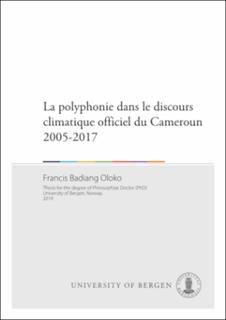La polyphonie dans le discours climatique officiel du Cameroun 2005-2017
Abstract
The present thesis has two complementary objectives: one empirical goal and one theoretical challenge. The interpretation of Cameroon official discourse on climate change is the primary aim. However, to achieve this, the thesis needs to develop a theoretical framework of its own. In fact, Cameroon’s president has voiced his opinion about climate challenges on various occasions. It is possible to envisage that the interpretation of his speeches will provide an overview of his vision on this global crisis. Meanwhile, the world is globalized due to the effects of this very climate crisis (Lamizet 2013). Consequently to this globalization, the positions, the intentions and the ambitions, that is the answers to the overall question ‘what can/should be done?’ begin to get intertwined and confused amongst the numerous negotiating partners. It can therefore be of a social, environmental and political interest to disentangle the voices in order to have a better understanding of who says what, who aims to do what. The project’s focus is on Biya’s discourse on climate between the year 2005 and the year 2017 and has the following research questions: (1) Which forms does polyphony take in Biya’s climate speeches? (2) What are the major points of view that emerge from Cameroon's official discourse on climate and what are the relationships between the speaker’s point of view and the rest? (3) Has Cameroon's official position changed over the (12) years? Discourse polyphony was selected as the theoretical framework to investigate these questions. It was first developed by Gjerstad (2011). The current project narrows its scope as it bridges from the ScaPoLine theory (Nølke, Fløttum and Norén 2004) to the praxématique theory (Bres 1999). The former focuses solely on linguistic markers that signal the presence of a voice other than that of the main speaker. The latter adds contextual information through its dialogic dimensions. The combination of both helped identify and disentangle the voices beyond the frontiers of semantic instructions and highlight the relationships they have with one another thanks to the ScaPoLine’s polyphonic configuration. It was found that there exist diverse but recurring forms of polyphony in the analyzed speeches. Besides, Biya has often used climate for geopolitical positioning. He repeatedly advocates consensus on climate challenges and highlights the challenges his country is faced with and the achievements it has made. Biya’s polyphony can therefore be said to be a consensus building and an advocacy one. This seems to lead to the conclusion that Cameroon’s position has remained quite constant over the years. Biya is for the idea of taking binding measures to reduce greenhouse gases emissions. These measures will however need to be fair as they will take into account the vulnerability of certain countries, related to their geographical and/or economic situation.
